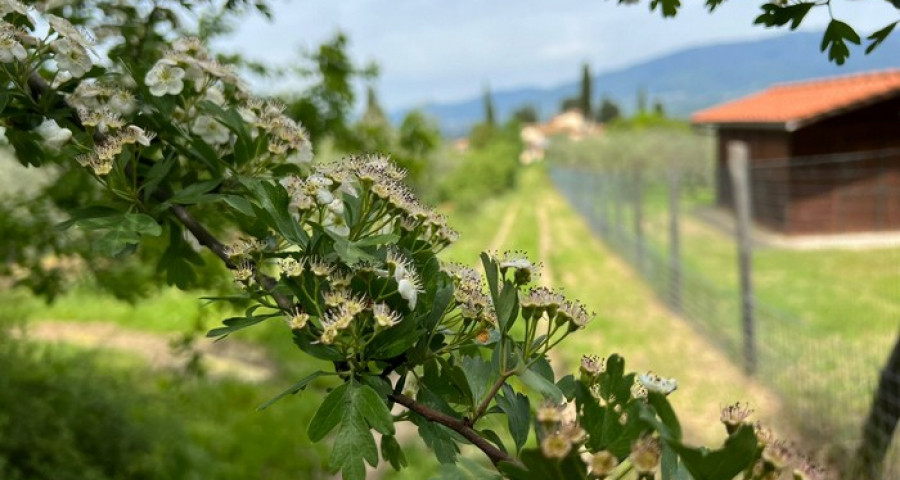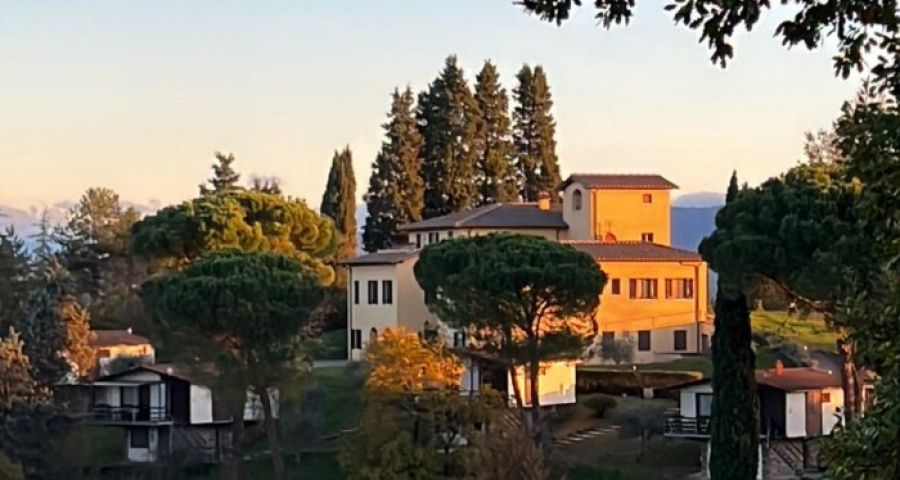Agorà - Pietro Del Soldà warns against fusion and identity obsession in his latest essay, pathologies that threaten democracy
by Luigino Bruni
published in Avvenire on 10/23/2025
Pietro del Soldà, philosopher and well-known and respected journalist on Radio 3, continues his reflection on freedom, friendship, and love, which are all words that precede life, both individual and collective, in Amore e libertà Per una filosofia del desiderio (Feltrinelli, 176 pages, €18.00). A book written in brilliant, cultured, engaging, and at times poetic prose. It is a book about love and freedom, and about the possibility and necessity of expressing them together, of saying one by saying the other, and in saying them reciprocally, understanding their challenges, paradoxes, incompleteness, and pitfalls.
Already in the Introduction, we find many of the book's theses: "There is no happiness outside of love, says Diotima in the Symposium, and there is no desire either: if it is devoid of erotic impulse, in fact, it is not true desire, it does not shake me to the core, it does not make me experience that state of radical deprivation which is instead the essence of desire and thus does not allow me to touch eudaimonia, the happiness that springs from harmony with the daimon, my ‘divine part’: if I do not love and am not loved, I will never achieve this harmony." Love is therefore loving and being loved. Del Soldà is well aware that Plato's eudaimonia, which he talks about, does not coincide with Aristotle's, where happiness is little associated with the divine daimon and much with virtues, especially civic ones. Del Soldà's discourse is, in fact, a discourse on love that starts from Plato's vision, and this immense philosopher remains the main constant axis with which he will relate the many other authors he will introduce us to (Plotinus, Augustine, Hegel, Girard, Nietzsche, Simmel, Dumont, etc.: an index of names would have been useful). The delicate point, which I introduce immediately, is whether it is possible and productive to articulate a discourse on love by defining it solely, or primarily, as eros. We will see this at the end of this note.
But, the author immediately adds, “Love, Diotima warns, is also a cunning deceiver, doleros, a ‘weaver of snares’,” not least because it is the child of poros, i.e., expediency. So, to manage or tame eros (Del Soldà often refers to Plato's myth of the charioteer), we need to talk to eros; it is not just irrational passion, nor should it become so: “Logos and Eros, after all, are not enemies at all; on the contrary, the great lesson of Greek philosophy is that their bond is deep and inextricable: one can illuminate the shadow areas of the other.” Eros does not only dialogue with Logos, he also speaks continuously with Thanatos, the third axis of any discourse on love-eros, and perhaps on love in general.
And we immediately arrive at the central thesis—at least one of the most important—of the book: “Knowing how to live one's erotic nature to the fullest means opening oneself to the unknown and to otherness: the ‘free love’, eleutheros eros, of which Socrates speaks to Phaedrus and which we must pursue against all obstacles, is the main antidote to that ‘identity obsession’ that today represents the main threat to democracy.” Del Soldà develops his discourse on love by moving between its two drifts or pathologies. The first is that of fusion, “which aspires to merge lovers into one thing” and which finds its first manifestation in “the famous myth narrated by Aristophanes in the Symposium,” that is, “to recompose the lost unity of that primal being that existed in remote times.” The second pathology is that of “personal identity, which remains within its own confines, awaiting the recognition of others, and is placed before any engaging relationship.” Here, the nomadic nature of eros is renounced, because the good life lies in "letting go, in ‘throwing away life,’ even in love: we need to fall, and we must not be afraid of it. Or rather, fear will always accompany us... And that's okay." Without ending up, however, in the myth of fusion. The pages criticizing those who decide to stop living for fear of dying, of not attempting the wild adventure of eros only for fear of thanatos, are the most beautiful and dense pages of the book, revealing an original line of thought.
To try to escape from this kind of tragic choice, Del Soldà finds help in Plato (Phaedrus), Lucretius, and the politicization of Eros: “Love is, and always will be, the emergence of the essential desire of that strange creature, the human being... who continues to be what he has always been: zoon politikon, a ‘political being’ who speaks, thinks, expresses emotions, and organizes his life in a common space, the polis.”
Also important and beautiful are the pages dedicated, in the wake of Lacan (and Recalcati), to the incompetence of eros due to the reciprocal nature of desire, its being a desire for a desiring desire: “My desire is not just a desire for you, as if you were an inert object (a prey, in fact), but a desire for your desire.” The need for desirability makes the “reciprocity of love, therefore, at once full and imperfect, complete and unattainable. Another enigma, in short.” Hence the identification of a central node of the mystery of love-eros: “If the encounter between lovers is perfect and crystal clear, without shadows, if not even a subtle crack creeps in to disrupt the process of recognition, then it is likely that things will end badly.” In love, therefore, there must be “the desire to miss each other, to not understand each other, or to understand each other only partially.”
Del Soldà's research on eros as freedom leads him to explore bold solutions, such as overcoming the couple: “It is not necessarily true that overcoming the couple—at least as we have known it until now—is necessarily a bad thing. It is not certain that it would necessarily lead to the decline of romantic feelings.” We find it difficult to follow the author in this transcendence of the couple in erotic love.
To understand this (respectful) difficulty, we need to open a discussion on the forms of love. Del Soldà's book primarily talks about eros. But the Greek world, and then Christianity and Western humanism, tell us about many loves: love as a plural semantics. Eros is the form of love at the center of Plato's discourse, and that of other Greeks.
Aristotle, in his Ethics, also talks mainly about philia, which, incidentally, Del Soldà also discussed at length in his previous essay Sulle ali degli amici (On the Wings of Friends) (2022). Philia is not eros; it resembles it, it is not its opposite, but it is another form of love. The Greek world also knew love for brothers, sisters, or parents. The Gospels and Paul then spoke to us of a third form of love, agape.
The Greek Christian lexicon was able to distinguish between “I love you” said to a beloved woman and “I love you” said to a friend, while recognizing that the latter was neither inferior nor less true than the former. Christianity then added a third Greek word to express another shade of the same love, already present in the Hebrew Bible and, above all, already present in life. This third, wonderful word is agape, the love that knows how to love those who are not desirable and those who are not friends.
These are dimensions of love that are often found together in true and important relationships. Certainly in friendship, where philia is never alone, because it is the first to need friends. It is accompanied by a passionate desire for friends and is nourished by agape, which allows it to endure, to rise again from our failures and our fragility. A friendship that is only philia is not warm and strong enough to keep us from being alone on our paths. But it is philia that binds eros and agape together and unites them—even Jesus needed the register of philia to tell us of his love. In those very few friendships that accompany us for long stretches of life, sometimes until the end, philia also encompasses the colors and flavors of eros and agape. These are the friends we have forgiven and who have forgiven us seventy times seven, those who, when they did not return, were awaited and desired like a bride or a child. Those we have embraced and kissed in a way that is both similar and different from other embraces and kisses, those with whom we have often mixed our tears until they merged into the same salty drop. That is why few pains are greater than that of the death of a friend—on that day, a piece of our heart stops beating and never starts again. There is not only a radical struggle between eros and thanatos; there is another, similar and different, between philia and thanatos, and there are friends who continue to live, to resist pain and illness, only because they are waiting to see us again on our next visit home or to the hospice, when that philos that comes is worth a whole lifetime, the whole philosophia of the earth.
Philia and even more so agape open up the love of the couple, leading them to transcend and surpass themselves. It is more difficult to think of a good overcoming of the couple if we remain solely in the register of Eros. Of course, love is freedom, as the title of the book says, but love is not only freedom. Human love is many things; it can be described with many words that qualify, exalt, and limit the scope of freedom. First of all, freedom is also a plural word (freedom from, freedom of, freedom with, freedom for...), and some of these prepositions directly refer to the twin word of good civil and political freedom: responsibility. Because if the erotic encounter is an encounter between individuals who are totally disengaged and irresponsible towards each other, that freedom only generates deception and unhappiness, some of which are also outlined by Del Soldà in the first part of the essay. Because, as highlighted in chapter 4, eros has a unique and inseparable connection with the body and with the typical responsibilities of the body (the body is not only beauty and desire).
Eros is not enough for responsible love. It is not enough for the family, for wives, for husbands, it is not enough for children, it is not enough for our wounds and those of others to be sustainable and possible.



